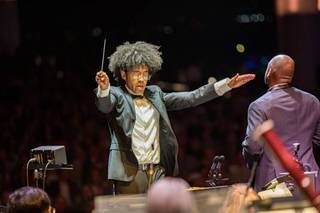|
Back
San Diego’s Poetry and Passion New York
Isaac Stern Auditorium, Carnegie Hall
10/13/2023 - & October 6 (Aliso Viejo), 7 (San Diego), 12 (Bethlehem), 2023
Carlos Simon: Wake Up: A Concerto for Orchestra
Antonín Dvorák: Cello Concerto No.2 in B Minor, Opus 104
Dmitri Shostakovich: Symphony No.5 in D Minor, Opus 47
Alisa Weilerstein (Cello)
San Diego Symphony Orchestra, Rafael Payare (Music Director/Conductor)

R. Payare (© San Diego Symphony Orchestra)
“To slumber amongst the awakened
is more difficult
than staying awake amongst the slumbering...
“slumbering can be contagious,
one slumber leading to another,
another, ..... and another
till an epidemic of slumber explodes.
“During the pandemic of sleep the despot sings of peace...
Like sleep, wakefulness too is contagious,
One thought sprouts, and another... and another.
becoming a bountiful harvest of thoughts.
Things, a poet knows better
than a despot.”
Rajendra Bhandari (Inspiration for Carlos Simon’s Wake Up)
The San Diego Symphony Orchestra’s Carnegie Hall concert Friday night was highlighted by one of the world’s most poetic cellists, and by a young conductor already established for his monumental grandeur. Add to this was one of history’s most poetic concertos and a symphony whose last 20 bars exemplify monumentality.
Yet for this listener, the opening work, Wake Up: A Concerto for Orchestra was as memorable as the eagerly anticipated Dvorák and Shostakovich. Composer Carlos Simon offered a work which only incidentally gave a picture to the titular poem. Instead, Wake Up gave a chance for Rafael Payare to show off his splendid orchestra.
A brief personal history. The British conductor David Atherton had been the San Diego Symphony’s Music Director, simultaneously serving with the Hong Kong Philharmonic when I was living there. For the latter orchestra, he offered what they needed most (and for which he was resented by the players). Strict discipline. A discipline which precluded great artistry.
For San Diego, as Mr. Atherton told me, he could put away the pedagogical baton and instill a kind of artistry. Though never artistry up to his martinet standards.
That artistry did come out in Mr. Simon’s Concerto for Orchestra. The title Wake Up had nothing in common with Bach’s Wachet auf or Clifford Odet’s Awake and Sing. This was from the Nepali-language poem by Sikkim-resident Rajendra Bhandari.
(The program notes by Gerard McBurney were enlightening and extensive. But omitting the poem itself. I have remedied that with a shortened version above.)
Mr. Simon’s only overt reference to the poem was a constant two‑note motif, the notes sounding like Wake Up. The remainder of the 20‑minute work varied in tempo and themes. But it never varied in its “orchestral color” tints and changes. Here with flute solos segueing into woodwind chorale. Here, with the excellent San Diego strings, then with non‑showpiece percussion.
All of it ending with the full orchestra consorts giving a muted rip‑roaring finale.
Both Simon and Payare wore purple jackets for their bow. A bit of double royalty?

A. Weilerstein/C.Simon
The following Dvorák Concerto with Payare and Weilerstein gave truth to Shakespeare’s “Let me not to the marriage of true minds admit impediments.” At least this writer could find no impediments.
Ms. Weilerstein, though, could well be reviled a bigamist! Married to both conductor Payare and her cello. I have no inside info on the first marriage. But her cello sings like a child, its poetry played as a serenade not only to Dvorák but music itself.
I heard her at Caramoor this summer (the feisty Shostakovich First), and here she showed a not‑totally dreamy Dvorák. Her lines, her articulation, her tones seemed perfect. And when necessary, Mr. Payare ramped up the San Diegoans (San Diegoites?) as a sometime thunderous background.
She played a Bach Sarabande as an encore, again receiving the usual plaudits.
From poetry to desolation, Payare–already lauded for his Mahler–worked well on the equally monumental Shostakovich. Like Mahler, each movement was an epic in itself. As expected, the conductor led an ominous, ironic opening, played the waltz like that of a drunken Vladivostok sailor, and took the centerpiece, that profound, desolate, literally nightmarish Largo with terrifying color.
Of course the finale is Shostakovich at his most triumphant–probably ordered by Stalin and Molotov. Yet no conductor dares hold back. The marches bordered on war, the hushes whispered–and Mr. Payare took the ultra‑agitated ending with deserving blazing glory.
Harry Rolnick
|